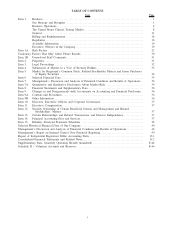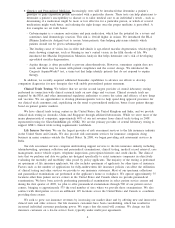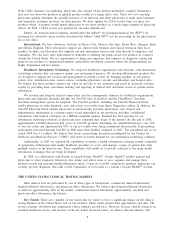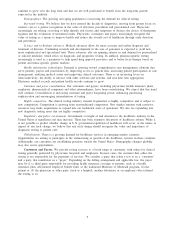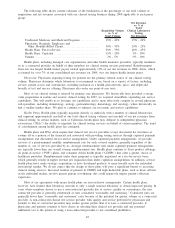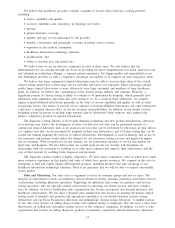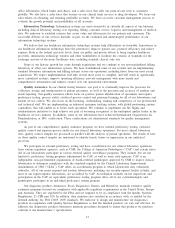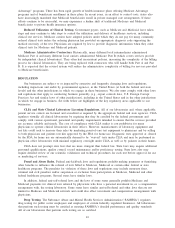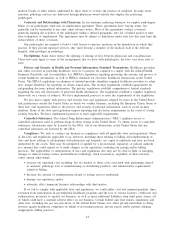Quest Diagnostics 2008 Annual Report Download - page 20
Download and view the complete annual report
Please find page 20 of the 2008 Quest Diagnostics annual report below. You can navigate through the pages in the report by either clicking on the pages listed below, or by using the keyword search tool below to find specific information within the annual report.With 510(k) clearance for marketing, physicians who operate CLIA-certified moderately complex laboratories
may now use these two products to quickly produce results in a single office visit. These two tests can help
physicians quickly determine the possible presence of an infection and allow physicians to make more informed
and immediate treatment decisions for their patients. We have applied for CLIA-waived status for these two
products which, if granted, would permit physicians to use these products in a much larger segment of physician
offices. In 2008, a CLIA waiver was granted for our urine albumin test.
Enterix, an Australia-based company, manufactures the InSure威fecal immunochemical test (FIT) for
screening for colorectal cancer and has developed the InSure威Quik FITtest for processing by the physician in
his or her office.
International. We have laboratory facilities in Mexico City, Mexico; San Juan, Puerto Rico; Gurgaon, India;
and Heston, England. These laboratories support our clinical trials business and clinical testing in their local
markets. In India, our laboratory also supports our risk assessment services and sales directly to employers and
consumers. We also have sales representatives dedicated to offering our point-of-care test products in countries
outside the United States. We see opportunities to bring our experience and expertise in diagnostic testing and
point-of-care products to international markets, particularly developing countries where the testing markets are
highly fragmented and less mature.
Healthcare Information Technology. We empower healthcare organizations and clinicians with information
technology solutions that can improve patient care and medical practice. We develop differentiated products that
are designed to support the creation and management of patient records, by bringing together, in one patient-
centric view, information from various sources, including physician’s records and laboratory and hospital data.
We believe that these products enhance the value we provide to our customers and result in increased customer
loyalty by providing more convenient ordering and reporting of clinical tests and better access to patient-centric
information.
We develop and integrate clinical connectivity and data management solutions for healthcare organizations,
physicians and clinicians primarily through our Care360 suite of products and the ChartMaxx威electronic
document management system for hospitals. The Care360 products, including our Care360 Physician Portal,
enable physicians to order diagnostic tests and review test results from Quest Diagnostics online. In addition, the
Care360 Physician Portal enables physicians to electronically prescribe medication, view clinical and
administrative information in a patient-centric record maintained in our repository and share confidential
information with medical colleagues in a HIPAA-compliant manner. Demand has been growing for our
information technology solutions as physicians have expanded their usage of the Internet. By the end of 2008,
approximately 140,000 physicians had access to Care360 products. Excluding our AmeriPath business, over 70%
of our test orders and approximately 85% of our test results were being transmitted electronically. E-prescribing
medications processed through Care360 in 2008 more than doubled compared to 2007. The annualized rate as we
exited 2008 was 4.5 million. We believe that recent e-prescribing incentives promulgated by the Centers for
Medicare and Medicaid Services (“CMS”) will foster increased demand for our information technology solutions.
Additionally, in 2007 we acquired the capabilities to deploy a health information exchange system comprised
of proprietary technologies that enable healthcare providers to access and manage a range of patient data from
multiple sources at the point-of-care. These capabilities will enable us to provide solutions to the many health
information exchanges that are being developed.
In 2008, we collaborated with Google to launch Google Health. Google Healthenables patients and
physicians to share diagnostic laboratory data online, and allows users to save, organize and manage their
medical records and personal health information online. Using our Care360 connectivity products, physicians can
securely provide diagnostic data with a brief explanation of test results to a patient’s Google Healthaccount.
THE UNITED STATES CLINICAL TESTING MARKET
Most clinical tests are performed by one of three types of laboratories: commercial clinical laboratories;
hospital-affiliated laboratories; and physician-office laboratories. We believe that hospital-affiliated laboratories
account for approximately 60% of the market, commercial clinical laboratories approximately one-third and
physician-office laboratories the balance.
Key Trends. There are a number of key trends that we expect to have a significant impact on the clinical
testing business in the United States and on our business. These trends present both opportunities and risks. The
recent economic slowdown may temporarily reduce industry growth rates. However, because clinical testing is an
essential healthcare service and because of the key trends discussed below, we believe that the industry will
8



